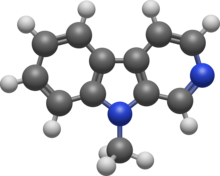9-甲基-β-咔啉
| 9-甲基-β-咔啉 | |
|---|---|

| |

| |
| IUPAC名 5-Methyl-5H-pyrido[3,4-b]indole 5-甲基-5H-吡啶并[3,4-b]吲哚 | |
| 别名 | 9-Me-BC 9-甲基-9H-β-咔啉 9-甲基去甲哈尔满 9-MBC N-甲基-β-咔啉 |
| 识别 | |
| CAS号 | 2521-07-5 |
| PubChem | 164979 |
| ChemSpider | 144638 |
| SMILES |
|
| MeSH | C529608 |
| 性质 | |
| 化学式 | C12H10N2 |
| 摩尔质量 | 182.22 g·mol−1 |
| 若非注明,所有数据均出自标准状态(25 ℃,100 kPa)下。 | |
9-甲基-β-咔啉(英语:9-Methyl-β-carboline,简称9-Me-BC)是β-咔啉家族的杂环胺,是一种研究性化学物质。[1]
化学[编辑]
9-Me-BC是β-咔啉的甲基化衍生物,分子式为C12H10N2。
它可以通过对游离碱β-咔啉(去甲哈尔满)进行埃施魏勒-克拉克反应来制备[來源請求]
生物效应[编辑]
多巴胺能神经元细胞培养物的体外研究表明,在长期给予鱼藤酮后,酪氨酸羟化酶和相关转录因子的表达增加,神经突生长增加,神经元再生,炎症细胞因子的表达减少。[2]在原代中脑多巴胺能神经元细胞培养物的研究中,该物质增加了分化的多巴胺能神经元的数量,并产生了更高水平的与多巴胺能分化相关的转录因子。[3]9-甲基-β-咔啉还在体外抑制神经毒素前体MPTP向多巴胺能神经毒素MPP+的氧化过程。[4]
啮齿动物体内研究表明,海马体多巴胺水平升高,径向臂迷宫测试中的空间学习表现得到改善,并且海马齿状回的树突生长增加,[5]在帕金森病动物模型中,左侧表达酪氨酸羟化酶的神经元数量恢复,而注射MPP+后纹状体中此类细胞的数量减少了50%。[6]
9-甲基-β-咔啉是一种已知的单胺氧化酶A和单胺氧化酶B抑制剂,并已被提议在帕金森病的治疗中进行进一步研究。[7]
参见[编辑]
参考资料[编辑]
- ^ Polanski, W; Enzensperger, C; Reichmann, H; Gille, G. The exceptional properties of 9-methyl-β-carboline: Stimulation, protection and regeneration of dopaminergic neurons coupled with anti-inflammatory effects.. J Neurochem. 2010, 113 (6): 1659–1675. PMID 20374418. doi:10.1111/j.1471-4159.2010.06725.x
 .
.
- ^ Polanski, W; Enzensperger, C; Reichmann, H; Gille, G. The exceptional properties of 9-methyl-β-carboline: Stimulation, protection and regeneration of dopaminergic neurons coupled with anti-inflammatory effects.. J Neurochem. 2010, 113 (6): 1659–1675. PMID 20374418. doi:10.1111/j.1471-4159.2010.06725.x
 .
.
- ^ Hamann, J; Wernicke, C; Lehmann, J; Reichmann, H; Rommelspacher, H; Gille, G. 9-Methyl-β-carboline up-regulates the appearance of differentiated dopaminergic neurones in primary mesencephalic culture.. Neurochem. Int. 2008, 52 (4–5): 688–700. PMID 17913302. S2CID 24226033. doi:10.1016/j.neuint.2007.08.018.
- ^ Herraiz, T; Guillén, H. Inhibition of the bioactivation of the neurotoxin MPTP by antioxidants, redox agents and monoamine oxidase inhibitors.. Food Chem. Toxicol. 2011, 49 (8): 1773–1781. PMID 21554916. doi:10.1016/j.fct.2011.04.026. hdl:10261/63126.
- ^ Gruss, M; Appenroth, D; Flubacher, A; Enzersperger, C; Bock, J; Fleck, C; Gille, G; Braun, K. 9-Methyl-β-carboline-induced cognitive enhancement is associated with elevated hippocampal dopamine levels and dendritic and synaptic proliferation.. J Neurochem. 2012, 121 (6): 924–931. PMID 22380576. doi:10.1111/j.1471-4159.2012.07713.x
 .
.
- ^ Wernicke, C; Hellmann, J; Zieba, B; Kuter, K; Ossowska, K; Frenzel, M; Bencher, NA; Rommelspacher, H. 9-Methyl-beta-carboline has restorative effects in an animal model of Parkinson's disease.. Pharmacol Rep. 2010, 62 (1): 35–53. PMID 20360614. doi:10.1016/s1734-1140(10)70241-3.
- ^ Polanski, W; Reichmann, H; Gille, G. Stimulation, protection and regeneration of dopaminergic neurons by 9-methyl-β-carboline: a new anti-Parkinson drug?. Expert Rev Neurother. 2011, 11 (6): 845–860. PMID 21651332. S2CID 24899640. doi:10.1586/ern.11.1.
- ^ Vignoni M, Rasse-Suriani FA, Butzbach K, Erra-Balsells R, Epe B, Cabrerizo FM. Mechanisms of DNA damage by photoexcited 9-methyl-β-carbolines. Org Biomol Chem. 2013, 11 (32): 5300–9. PMID 23842892. doi:10.1039/c3ob40344k.
